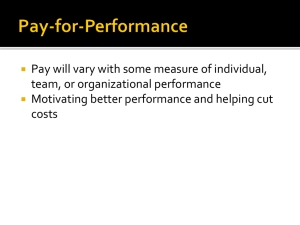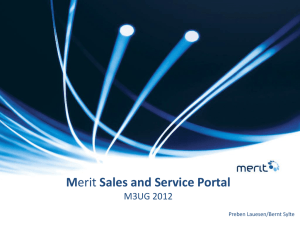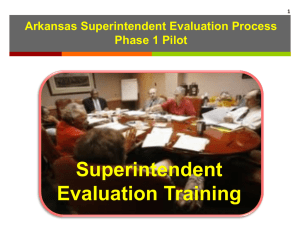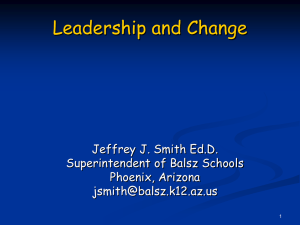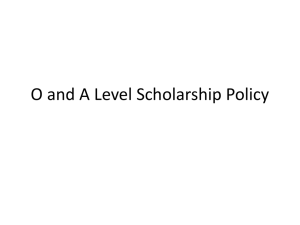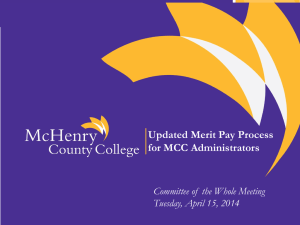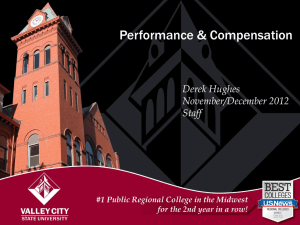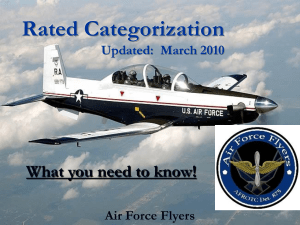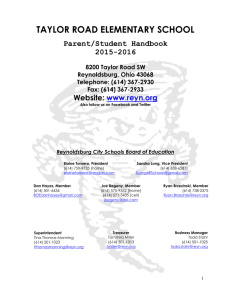Strategic Steps to a Merit System
advertisement
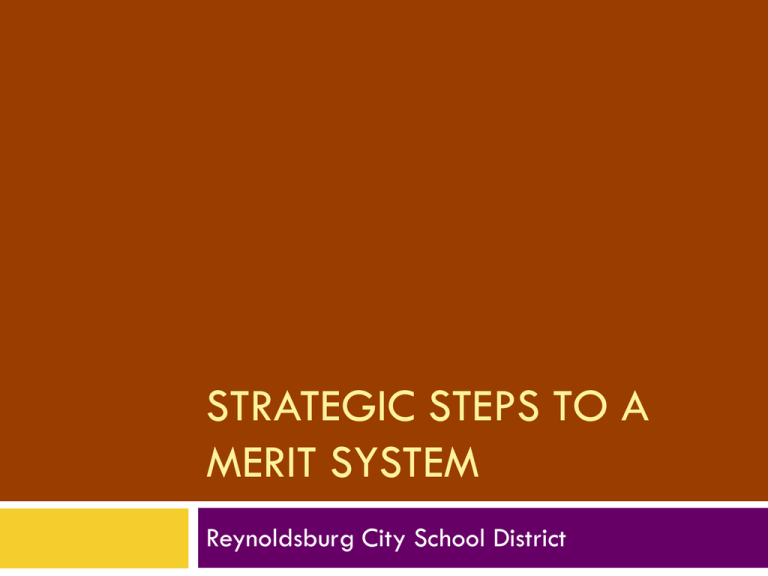
STRATEGIC STEPS TO A MERIT SYSTEM Reynoldsburg City School District About Us A first-ring suburb of Columbus, Reynoldsburg’s demographics are reflective of the state and the nation. Reynoldsburg has … 34,000 residents 6,000 students 700 staff Median income: $34,000 Average teacher salary: $62,000 Fiscal Year 2011 Revenues: $55 million Other Revenues 10% Real Estate Taxes 34% State Foundation 48% Income Tax 8% Effective Operating Millage 0 Bexley New Albany-Plain Local Upper Arlington Worthington Westerville Dublin Hilliard Grandview Heights Canal Winchester Columbus South-Western Gahanna Jefferson Whitehall Reynoldsburg Groveport Madison Hamilton Local 10 20 30 40 50 Tax Effort 0 Columbus Whitehall Groveport Madison Canal Winchester Reynoldsburg Grandview Heights Hilliard Westerville Gahanna-Jefferson South-Western Worthington Bexley Upper Arlington Hamilton Dublin New Albany-Plain 20 40 60 80 100 120 140 Drivers A theory of improvement Does merit pay affect behavior? Public perception In this economic climate, must any raise be tied to performance and results? Critical Points Timeline 2002 Project SOAR value-added pilot (grades 3-8) 2004 Student Improvement Incentive Award negotiated 2006 Began T-CAP (classroom level value-added analysis) 2007 Additional SIIA language negotiated First SIIAs awarded ($8,000) 2009 Began high school value-added pilot Principal evaluation pilot (Ohio Department of Education) 2010 In-house principal/administrator evaluation tool implemented Teacher evaluation pilot (Ohio Department of Education) 2011 Superintendent and assistant superintendent merit pay negotiated Data Driven Successful organizations know how their employees impact their results. Value-Added with Battelle for Kids Project SOAR began to demonstrate how student progress information can be used as a diagnostic tool for educational improvement in grades 3-8. T-CAP (Teachers Connecting Achievement and Progress) provides individual teachers with reliable information about the progress made by the students they teach. Ohio Value-Added High Schools initiative uses ACT-aligned, end-of-course exams to provide classroom-level progress data in grades 9-12. Effective Evaluations Successful organizations improve outcomes by providing timely, accurate and constructive guidance to employees. Evaluating results Establishing a fair evaluation process remains a critical challenge in developing a merit system Ohio’s principal evaluation pilot (2008-2010) Ohio’s teacher evaluation pilot (ongoing) Race to the Top work supports ongoing discussions, tool development and trials. Fair Contracts Successful organizations are able to attract/retain talented employees within sustainable budgets. Student Improvement Incentive Award If student performance in a classroom is significantly higher than expectations, the Superintendent, with Board approval, shall have the unilateral authority to grant an award of up to Two Thousand Dollars ($2,000.00) per applicant. Prior to receiving a Student Improvement Incentive Award, the following procedure shall apply: 1. 2. Teachers must apply in writing, must document increased student performance, and must include their Principal’s written endorsement with the application; or Teachers can be nominated by any District employee by completing a form provided by the Board. Award Process Applications were evaluated by a committee of outside experts, including representatives of: Columbus State Community College Ohio State University School Support Council of Ohio Local business/government The committee reviewed applications and recommended award amounts. Process was developed over two years. Building buy-in 2005-06 Four teachers received $2,000 each 2006-07 18 teachers received a total of $29,500 7 applications denied 2007-08 15 teachers received a total of $21,000 8 applications denied 2008-present None awarded due to budget cuts Administration leading Superintendent became first in the district with real merit pay in contract Assistant superintendent immediately followed District administrators/principals merit system coming next year, tied to new evaluation tool Superintendent’s contract "It's kind of unlikely he's going to achieve all four. But we want him to reach high. We want him to shoot for the stars.“ Beginning in the 2011-2012 school year and thereafter, the Board shall pay a performance incentive between 0% and 5% of the annual base salary for each goal/objective met with a maximum of four goals/objectives, which shall be cumulative. Each goal/objective will be tiered with a prescribed measure(s) to determine the percentage of performance incentive met. This amount is in addition to the salary provided in paragraph 4 above. It is the intent of the parties that the goals/objectives will be defined collaboratively and will be outcome based. The Board will be the sole judge of whether the Superintendent met or exceeded the goals/objectives. Goals/Objectives will be agreed upon by July 31 of the Mary Burcham, contract year immediately preceding the year for which the goals/objectives are Board President applicable. The determination of whether the goals/objectives have been met or exceeded will be made by the Board on or before June 30 of each contract year and the performance incentive will be paid in the second pay in July following that determination. Public reaction (from the blogosphere) Negative Merit pay for management is a joke. Do you ever think you'll ever see a superintendent who doesn't 'earn' his/her merit pay?(Are you kidding...?) In fact, the Reynoldsburg School Board just gave Mr. Dackin a 24K pay raise. Positive "Merit pay" is a great idea as long as there's a fair and objective way of determining merit and quality of work. I'm also impressed that he and others have taken cuts and turned down previous bonuses. That's a sign that they're aware of the economic environment and not just out for themselves. Public perception of salaries Contrast to automatic step increases Role of inflation, cost-of-living Data as formative or summative Fair evaluations – objective v. subjective Building buy-in Challenges Merit pay is an integral piece of the broader systems of recruitment/ retention, rewards/sanctions, and public financial accountability.
